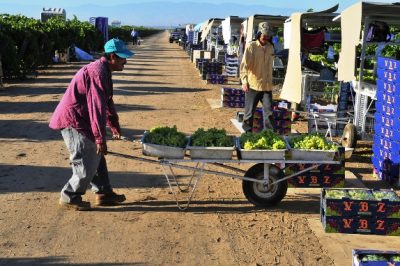Economic Impact
Immigrants are essential to the U.S. economy, filling roles from high-skilled tech sectors to agricultural labor and driving economic growth. They also contribute to the tax base and consumer spending. We champion reform that will maximize this effect and create a more diverse and competitive workforce.

DHS Needs to Target Violent Drug Cartels, Not Immigrants Trying to Reunite with Families
Times have changed along the U.S.-Mexico border. In just a few short years, Mexican drug cartels have taken over the people-smuggling business. Although U.S. border walls and fences have proliferated, they have done nothing to prevent the cartels from moving drugs, human beings, guns, and money back and forth across the border. The combination of heightened U.S. border enforcement and cartel violence has made crossing the border increasingly dangerous. Yet large numbers of unauthorized immigrants who were previously deported from the United States continue to risk their lives by crossing the border in order to reunite with their U.S. families. The Obama Administration’s current enforcement policies treat these family-bound migrants like hardened criminals, while failing to address the real threat to security—the cartels. Read More

Declining Cities Look to Immigrants to Revitalize Economies and Increase University Enrollment
In a recent speech to the U.S. Chamber of Commerce, New York City Mayor Michael Bloomberg highlighted the vital role immigrants play in stimulating economic growth. Bloomberg called for immigration policies that “spur innovation, increase the number of entrepreneurs who start businesses here, and create jobs for Americans on every rung of the economic ladder." With U.S. unemployment still hovering around 9%, some declining U.S. cities are also looking to harness the economic and entrepreneurial power of immigrants. Small towns, particularly in America’s rust belt, are contemplating programs that attract immigrant growth in hopes of revitalizing their towns and universities. Read More

Despite Lamar Smith’s Claims, E-Verify Is Not a Jobs Bill
BY TYLER MORAN, NATIONAL IMMIGRATION LAW CENTER While Chairman Lamar Smith (R-TX) promises that his mandatory E-Verify legislation (HR 2885) is a jobs creation bill, the mark-up of the bill in the House Judiciary Committee last week proved that it is anything but. Though the bill passed the committee by a 22-13 party line vote, the debate in committee and amendments offered make it crystal clear the bill would actually yield job losses. The debate leading up to the committee mark up also shows just how fractured conservatives have become on this issue—and much of it focuses on concerns over jobs. In fact, an unlikely coalition of progressive and conservative organizations joined together to oppose the bill, turning a host of job arguments upside down. Read More

Bridging the Ethnic Generation Gap: Why an Aging Population Will Depend on a New Generation of Workers
There is a generation gap in the United States and it is not only a difference in age. It is a difference in color as well. The predominantly white Baby Boomers are just this year beginning to reach retirement age. As they leave the labor force and the tax base over the next two decades, a new generation of Latinos and Asians will take their place in the U.S. economy as workers and taxpayers. It is the tax dollars of these immigrants and children of immigrants which will sustain the Social Security and Medicare programs upon which the Baby Boomers will rely. And it is these immigrants and children of immigrants who will become the doctors, nurses, health aides, and countless other workers upon whom so many aging Baby Boomers will depend. Read More

Give Me Your Tired, Your Poor, Your Huddled Masses…But Don’t Let Them Work?
Every year, thousands of people flee persecution in their home countries and seek safe haven in the United States. Many of them spend their entire savings on the journey, travel under life-threatening conditions, and arrive on our shores with not much more than the clothes on their backs. Those who are lucky find long-lost relatives, compatriots, or religious communities who help them get back on their feet. Then they begin the process of applying for asylum, which often takes years. Fortunately, our laws allow asylum seekers to obtain work authorization if their cases are not decided within 180 days. The 180 days, however, are counted by an “asylum clock,” which is too often stopped for unwarranted reasons. Read More

Better Immigrant Integration Leads to Economic Growth
Over the weekend, more than 27,000 people became American citizens during 285 naturalization ceremonies held across the country in honor of Citizenship Day (September 17). Becoming a citizen, however, is hard work. A new country, new rules, high costs, and little targeted support for new immigrants make what should be a journey of exploration and opportunity one that may be frustrating and lonely. Not surprisingly, problems such as these are a major obstacle to naturalization. Scholars note that despite the steady rise in naturalization rates over the decades, a shocking number of people do not naturalize are actually eligible to do so. In 2008, for example, while more than one million LPRs naturalized, more than eight million were eligible to do so. Developing better integration programs, however, may improve naturalization efforts and lead to economic growth. Read More

Improving the Naturalization Process: Better Immigrant Integration Leads to Economic Growth
Anyone who has ever attended a naturalization ceremony cannot help but be moved by the power of the moment. The participants enter as men, women, and children of diverse countries, but leave the room as citizens of one—the United States. For many, the path to that naturalization ceremony has been long and arduous, irrespective of whether they entered the United States as wealthy entrepreneurs or as refugees with nothing but the clothes on their backs. The process of obtaining lawful permanent resident (LPR) status, and ultimately U.S. citizenship, is often daunting. A new country, new rules, high costs, and little targeted support for new immigrants makes what should be a journey of exploration and opportunity one that may be frustrating and lonely. Consequently, in order to focus on ways to improve the naturalization process itself, we must take a step back and consider the nature of immigrant integration in the United States. The better our integration policies—and the sooner they begin—the more likely we are to improve the rate of naturalization. Read More

Lamar Smith’s E-Verify Arguments Defy Logic and Lack Evidence
Facing opposition from the left and the right, Rep. Lamar Smith appears to be willing to do and say just about anything to pass his “Legal Workforce Act,” (H.R. 2885), which would make E-Verify mandatory for all U.S. businesses. Smith continues to tout E-Verify as a magic bullet that will create jobs for millions of American workers despite all evidence to the contrary. Read More

Lamar Smith Introduces New Agricultural Twist to His Anti-Immigrant Agenda
Rep. Lamar Smith (R-TX), Chairman of the House Judiciary Committee, has added a novel new twist to his anti-immigrant agenda: letting more immigrant workers into the country. In defiance of logic, the man who believes that immigrants merely steal jobs from U.S. citizens now wants to import migrant agricultural workers. At a hearing today of the House Subcommittee on Immigration Policy and Enforcement, Rep. Smith rolled out his latest legislative proposal, called the “American Specialty Agriculture Act” (H.R. 2847). The bill would create a new “H-2C” visa for temporary agricultural workers to replace the existing H-2A program, and would allow growers to bring in up to 500,000 of these workers each year. Read More

California Passes Other Half of DREAM Act Package
While many applauded Governor Jerry Brown’s recent efforts to make college more affordable for all of California’s students, others insisted the state didn’t go far enough. Back in July, Gov. Brown signed AB 130—a bill that allows undocumented students enrolled in California’s public colleges and universities to receive privately-funded university scholarships from non-state funds. At the time, however, its companion bill, AB 131—which would allow undocumented students to apply for state-sponsored financial aid—was stuck in California’s Senate Appropriations Committee. Last week, despite opposition from immigration restrictionists, both California’s State Assembly and Senate approved AB 131 which is now on its way to Gov. Brown’s desk. Many predict Gov. Brown will sign the measure based on promises he made during his campaign. Read More
Make a contribution
Make a direct impact on the lives of immigrants.
